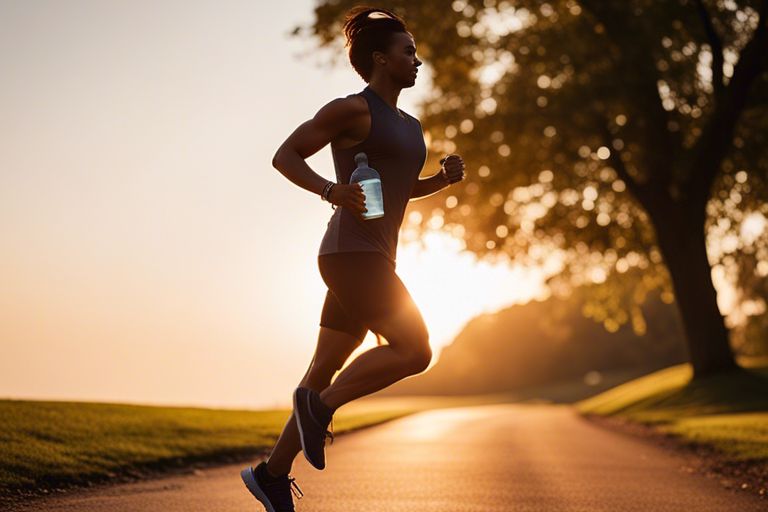Nutrition plays a crucial role in enhancing your jogging performance. Not only solid foods but also the liquids you consume can significantly impact your endurance levels. Hydration is critical, but what you drink before, during, and after your jog can affect how long you can keep going and how quickly you recover. This blog post will explore the best drinks to boost your endurance while jogging, helping you power through your runs and reach your fitness goals.
Key Takeaways:
- Hydration is vital: Proper hydration is necessary for endurance during jogging. Drink water before, during, and after your run to stay hydrated.
- Electrolytes are essential. To maintain proper muscle function, Replenish electrolytes lost through sweating by drinking electrolyte drinks or coconut water.
- Avoid sugary drinks: Avoid sugary beverages, as they can cause energy crashes and lead to dehydration. Opt for water or natural fruit juices instead.
- Consider caffeine: Consuming caffeine in moderation can enhance endurance performance by providing an energy boost. Just be mindful of the amount you consume.
- Post-run recovery drinks: After your jog, drink a protein shake or chocolate milk to help muscle recovery and replenish glycogen stores.
The Role of Water in Endurance Jogging
Understanding Dehydration
Dehydration is a common concern for endurance runners, as it can significantly impact performance and pose serious health risks. When the body loses more fluids than it takes in, dehydration occurs, leading to symptoms such as fatigue, dizziness, and muscle cramps. Joggers need to stay adequately hydrated to maintain endurance and prevent dehydration-related issues.
Recommendations for Water Intake Before, During, and After Jogging
Proper hydration is critical for successful endurance jogging. Drinking water before, during, and after a run is recommended to maintain optimal fluid levels in the body. Before jogging, consume around 500ml of water to ensure you start well hydrated. During the run, aim to drink around 150ml every 15-20 minutes to replace fluids lost through sweat. After jogging, replenish lost fluids by drinking at least 500ml of water within the first-hour post-exercise.
Electrolytes and Their Importance
Defining Electrolytes and Their Functions
Electrolytes are minerals that carry an electric charge when dissolved in the body fluids. These vital nutrients are crucial in various bodily functions, such as regulating muscle contractions, maintaining proper fluid balance, and ensuring optimal nerve function. Electrolytes are essential for maintaining hydration, especially during intense physical activity like jogging, to prevent cramping and dehydration.
Sources of Electrolytes and How to Include Them in Your Diet
Electrolytes can be found in various food sources, including fruits, vegetables, nuts, seeds, and dairy products. Foods rich in electrolytes include bananas, spinach, avocados, nuts, seeds, and yoghurt. To ensure you are getting an adequate intake of these vital minerals, incorporate a balanced diet that includes various foods. Additionally, electrolyte-rich sports drinks can be consumed during long-distance runs to replenish lost minerals and maintain hydration.
Energy Drinks and Endurance Running
Analysing the Pros and Cons of Energy Drinks for Joggers
| Pros | Cons |
| Provides a quick energy boost | High in sugar and artificial ingredients |
| It contains caffeine for improved alertness | Potential for dehydration |
| Convenient for on-the-go consumption | This may lead to dependency on caffeine |
Healthy Alternatives to Commercial Energy Drinks
When choosing a healthier option for endurance running, there are several alternatives to commercial energy drinks that can provide sustained energy without the added sugars and artificial ingredients. Consider options such as coconut water, homemade smoothies with natural ingredients, or infused water with fruits for a refreshing and nutritious hydration source.
Hydration Strategies for Long-Distance Jogging
Personalising Your Hydration Plan
Personalising your hydration plan is crucial for long-distance jogging. Factors such as sweat rate, weather conditions, and individual sweat sodium concentration can vary greatly between runners. It’s important to test different hydration strategies during training runs to find what works best for you. Keep track of how much you drink and how you feel during and after your runs to fine-tune your hydration plan.
Tips for Hydrating During Marathon Training and Races
Hydrating effectively during marathon training and races is critical to performance and recovery. Begin by hydrating well in the days leading up to your long runs and races. During training, aim to drink water or a sports drink every 15-20 minutes to maintain hydration. Take advantage of water stations in races and carry a hydration pack if needed. After your runs, replenish fluids and electrolytes to aid recovery and prepare for the next session.
- Stay consistent with your hydration plan throughout your training.
- Consider the temperature and humidity levels when adjusting your fluid intake.
- Pay attention to signs of dehydration, such as dark urine or dizziness.
- After your runs, focus on rehydrating with water and electrolytes to replace lost fluids.
Jogging and Nutrition – What to Drink for Endurance
Choosing the right beverage for endurance while jogging is crucial for maintaining performance and staying hydrated. Water is essential to prevent dehydration during exercise, and sports drinks can provide the necessary electrolytes to replenish what is lost through sweat. It’s important to avoid sugary drinks that can lead to energy crashes and opt for healthier options like coconut water or homemade smoothies. By staying informed about the best drinks for endurance, you can enhance your jogging experience and ensure that your body has the fuel it needs to go the distance.
Choosing suitable beverages that provide hydration, electrolytes, and sustained energy is essential for optimal jogging endurance. Making smart choices in what you drink can boost your performance and overall well-being during your jogging sessions.
FAQ
Q: What are the benefits of jogging for endurance?
A: Jogging helps improve cardiovascular fitness, strengthens muscles, aids in weight management, enhances mood and mental well-being, and boosts overall endurance.
Q: Why is nutrition important for endurance jogging?
A: Proper nutrition provides the necessary fuel for jogging, helps in muscle recovery, maintains energy levels, and supports overall performance during endurance activities.
Q: What should I drink to maintain endurance while jogging?
A: Staying hydrated while jogging is essential for endurance. Water is the best choice for hydration, but sports drinks containing electrolytes can also be beneficial for longer runs.
Q: How much should I drink before, during, and after jogging for endurance?
A: It is recommended to drink about 17-20 ounces of water 2 hours before jogging, 7-10 ounces every 10-20 minutes during jogging, and 8 ounces within 30 minutes after jogging to stay hydrated and maintain endurance.
Q: Are there any drinks to avoid while jogging for endurance?
A: For endurance, avoid sugary drinks, caffeine, and alcohol before and during jogging, as they can cause dehydration, stomach discomfort, and hinder performance.





